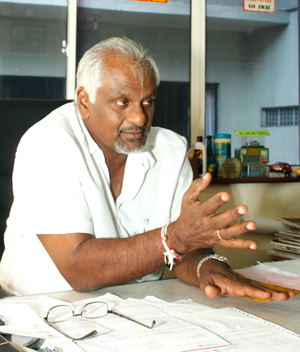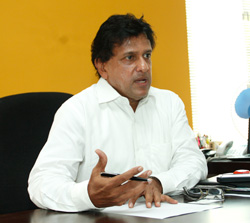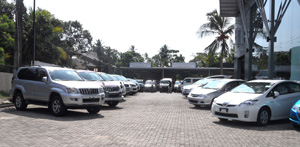ON THE ROAD - Sri Lanka’s used car industry is likely to be phased out eventually following government plans to allow for only year-old vehicles to be imported in the future.
This industry has over time captured a sizeable market share gaining much popularity among the consumers over the brand new vehicle dealers. However, the currency fluctuations, imposition of increased duty on cars and the reduction of the age of imported vehicles have had their toll on the industry.
 |
| Bandula Weerasinghe |
Colombo roads change post 1977
“When we started the currency was very strong and this situation was similar worldwide,” a veteran pioneer in the used car industry Bandula Weerasinghe told the Business Times.
The industry that started out in the late 1960s and 1970s was given a major boost in the post-1977 budget under the J.R. Jayewardene administration that led to the opening up of the Sri Lankan economy.
Mr. Weerasinghe said that it was in the 1978-1980 period that the industry blossomed and it was during this time when even he commenced operations. At the time, he noted there were only about four vehicle dealers that imported cars while others would buy and sell those that were available in the local market.
During the 1980s diesel and commercial vehicles like the Lite vans and trucks joined the roads of Colombo.
Subsequently, local consumers were becoming increasingly selective of the type and range of vehicle they wished to purchase, he related adding that they would be conscious of the condition of the vehicle and the accessories available.
Further, about this time, there were a number of individuals joining the industry; as a result, the product improved as competition continued to pick up until around 1985. Showrooms started coming up that changed the landscape from an era when most would have been carrying out the business in their own backyards.
 |
| Yoga Perera |
One of the first showrooms to come up in Colombo was Ishara Traders and Mannapperuma Traders and another in Katugastota, Kandy. Mr. Weerasinghe explained that his car sales outlet was one of the very first to be found along Dutugemunu Street in Kohuwala where now there are 39 altogether.
He pointed out that today they also cater to an exclusive clientele as a result of which they select and bring down even sports vehicles and other special vehicles even air freighting them in relation to demand.
Future demand likely to drop
But today a possible shift towards a reduction in age of vehicles is likely to hamper the ability of consumers purchasing vehicles, Vehicle Importers Association President Yoga Perera told the Business Times.
A flurry in demand was evident when the government in 2009 reduced the vehicle import duty. However importers noted that this was short-lived as they would now have to face up to the possibility of this industry soon fading out.
Mr. Perera noted, “You should not deprive the reconditioned vehicle buyer from getting a new vehicle.”
He pointed out that this year the age was reduced to two years from last year’s 3.5 years resulting in a 40% drop in sales. Lately the industry has gained its position as the one of the top 10 revenue earners for the Sri Lankan government, it was pointed out.
 |
| A car sale centre |
Sales improved in 2009 when a reduction in duty was imposed but a possible reduction in age of imported vehicle had negatively impacted on sales, he noted. Mr. Perera said that since the last 4-5 years each year the market had witnessed a decline in sales of 7-8% every year.
Top of the range abound
Commenting on the range of cars imported to Sri Lanka, Mr. Weerasinghe observed the country has seen some of the top range cars.
Prior to 1977 there were very few cars that plied the streets of Sri Lanka like the Morris and Oxford.
However, after this period there was an influx of vehicles with the Toyota’s and the Liteace, lorries and TATAs while later the Bentley and Porche also joined the roads of Colombo. Today the roads are inundated with a wide range of vehicles from Indian, British and Korean to Japanese and even Chinese.
Popularity in the Maruti Suzukis started out about 3-4 years ago with about 1000 imported per month while now the TATA Nano is gaining prominence with about 500 – 600 vehicles imported per month, he said.
In addition, the market has also seen an influx of hybrid cars imported on reduced duty as these vehicles operate as half electric and half gas and are half the price, he said.
It was pointed out that today almost every car manufacturer produces hybrid vehicles but purchasing it has become expensive.
Currently the most popular brands that continue to remain are Toyota and Nissan which are also considered the poor man’s car including the Mitsubishi and the Japanese Suzuki.
Mr. Perera on the other hand observed that when the European market faded away in the 1970s there was a shift towards the Japanese market. This shift was mainly due to the durability and standards and economical nature of the Japanese vehicle.
However, he complains that today it has become evident that there are sub standard vehicles that have entered the market “as there’s no conformity” adding that vehicles must ensure safety and economy for consumers. He pointed out that with vehicles from the Asian region entering the market “a person using a second hand Japanese car will not buy an Asian car.”
Trendy lifestyle
The second hand car industry has contributed to a marked shift in lifestyles among the Sri Lankan populace.
During the 1960s and late 1970s there was just a handful of cars seen on the roads of Colombo and in this respect it remained a vehicle exclusively for the elite.
However this trend started to take a shift since the post 1977 era when accessibility and ease of purchase was impacting on the people in a way they were now keenly awaiting the new second hand vehicle arrivals.
Today this trend has grown to an extent where some Sri Lankans believe in the myth that there is a need to change their vehicle every two years, Mr. Weerasinghe explained adding that on the other hand companies would maintain cars for a period of four years due to the leases obtained to purchase these following which they would consider buying a new vehicle.
“It’s a way of life,” he said but noted that today the reconditioned vehicle importers are directly affected as new car agencies are trying to push their new cars. But statistics indicate that for every 100 new cars sold per month about 1000 used cars are purchased by Sri Lankans, he said.
Vehicle purchasing trends and the story behind their number plates is also an interesting one where in the early days old cars had English number plates which shifted to the use of the “Shri” that reverted once again to the English number plate, Mr. Weerasinghe explained.
He said that today the consumer is able to purchase a number plate of choice upto three series ahead at a higher price as it previously cost only Rs.7, 500 but now it is at Rs.70, 000.
Other trends observed are car prices that which started out from Rs.100,000, Rs.150,000 and Rs.200,000 during the early days when this industry commenced operations in the country to imports today that range from Rs.2.5 million and upwards.
Moving on
The growth of the second hand car industry has moved in leaps and bounds that has built space for more complementary industries to flourish like the spare parts industry and imported body part traders, Mr. Weerasinghe said.
However, this is likely to change and create a sudden direct impact on all these sectors as a possible increase in duty and reduction in the age of imported second hand cars is imposed on the market.
“We had lots of meetings, we didn’t think it will happen in fact we thought that the cheaper the vehicle the more affordable it will be for the masses,” he said.
With speculation rife even after the presentation of the budget that there is a possibility it will be reduced importers believe the first to be affected will be the employees. He noted that if there is a duty hike the demand is likely to drop as imports are also curtailed at the moment. These sentiments were also echoed by other small and medium scale vehicle sales outlets including Mr. Perera.
The complementary industries and its dependants are likely to be affected once the age of imported vehicles is reduced resulting in a possible closure of an industry that had one time gained momentum and steady growth but will become only a part of history in the near future. |




